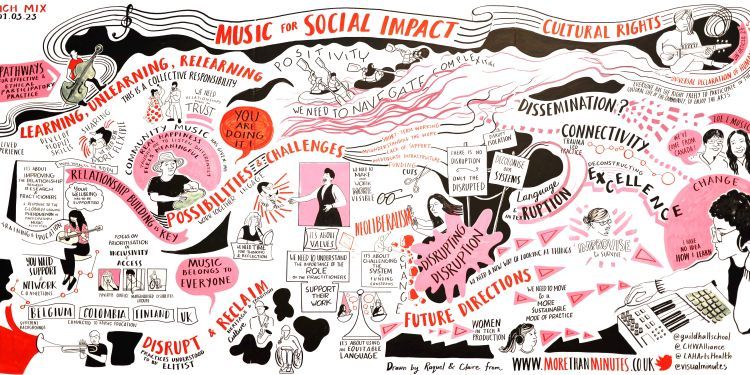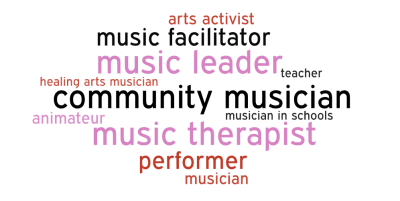

Introduction
Español→
"Music for social impact: Practitioners' contexts, work and beliefs" (MFSI) was a three-year international research project that considered participatory music practitioners' contexts, work and beliefs during 2020-2023 in Belgium, Colombia, Finland and the UK.
Why this research project?
Globally, there is a growing body of participatory music-making activities that work towards positive social change. At the time of this research, little was known about the practitioners that facilitate such practices. The MFSI project considered practitioner perspectives including why they do the work, what is important to them, and from that, what can be learnt for the field more widely.
Through systematic investigation of music practitioners that operate within music for social impact projects, this research sought:
- Deeper understanding of the changing nature of professional identities and roles of musicians in contemporary society,
- To critically inform ways in which funders and commissioners of SIMM work design artistic interventions for social impact,
- To inform the way that institutions responsible for the education and training of musicians further develop their programmes to best equip professional musicians of the future to negotiate the diverse contexts in which they are now required to deploy their skills.
Locations
Because the political and cultural imperatives that underlie MFSI activities are significantly influenced by local context, this project examined how these issues play out in four different locations (Belgium, Colombia, Finland and the UK). These places represent a spectrum of cultural and policy environments for the arts which makes possible to intertwine knowledge of the local practices and policies and the emerging global discursive change of the arts’ societal role. In each location, there is a significant amount of relevant artistic practice to interrogate, and an appropriate research capacity to orchestrate local enquiry within an understanding of the wider international environment (artistic, political, intellectual). This is important, not least because practitioners and funders are internationally interconnected (and mobile, frequently operating outside their home countries).
Lines of inquiry and approach
The following questions gave initial impetus to our study in each research location (NB all questions are directed at music practitioners that operate within music for social impact projects):
- What skills, conceptual frameworks, and musical repertoires do musicians bring to this work?
- To what extent do they adjust their pre-existing practice in response to identified social needs?
- How do they conceive pathways to impact, and make their own assessments of success?
- How does this type of work draw on the training and support they receive, and the teaching and performing work they do in other areas?
From this starting point, teams in Belgium, Colombia, Finland and the UK developed lines of inquiry bespoke to the practices and nuances of their location.
The project consisted of four phases:
| Phase | Year | Description |
|---|---|---|
| A | 2020 | Scoping context and environment in each location (sources include organisational websites, policy documents and funding parameters) |
| B | 2020-2021 | Open call to a practitioner online survey in each location (631 responses, 318 complete) |
| C | 2021 | In-depth interviews with practitioners (21 in Belgium, 23 in Colombia, 20 in Finland and 24 in the UK. Interviews conducted in country languages) |
| D | 2020-2023 | Analysis, some in-depth follow-ups and dissemination |
Who took part?
Practitioners from many and varied practices responded to the research open call. The following word cloud shows examples of participating practitioner self-identifying terms:

Researchers & Partners
The research was conducted by an international team and funded by the Arts and Humanities Research Council (AHRC, grant number AH/S005285/1) and the international platform for Social Impact of Making Music (SIMM).
Meet the Research Team →
Higher education institution partners:
- Fundación Universitaria Juan N Corpus, Bogota (Colombia)
- Sibelius Academy, University of Arts Helsinki (Finland)
- HOGENT (Belgium)
We also worked with regional partners in each location to develop events, reports and other activities including:
- Culture Health and Wellbeing Alliance (UK)
- London Arts and Health (UK)
- Ha Concerts (Belgium)
- Play Ground (Belgium)
- UNESCO Chair on Arts, Education and Peace (Colombia)
- Helsinki Music Centre (Finland)
The Music for Social Impact Project would like to thank everyone that contributed to the research. Special thanks go to the practitioners that gave their time, insights and reflections to the project, which are central to the research outputs.
Outputs
Our full range of outputs can be accessed on the following pages:
Presentations & Events →
Publications →











